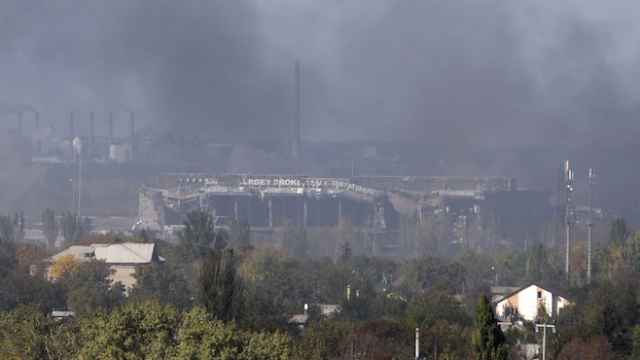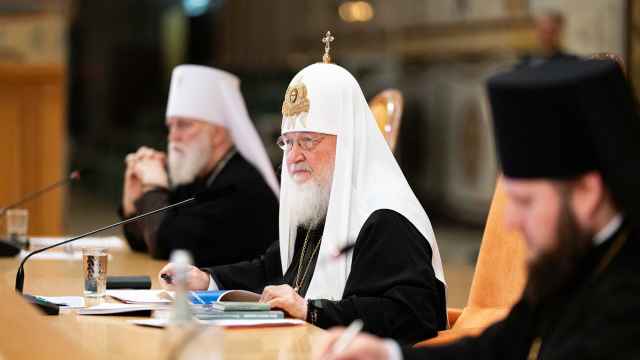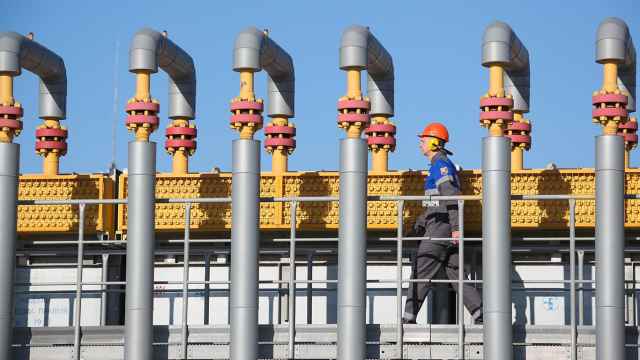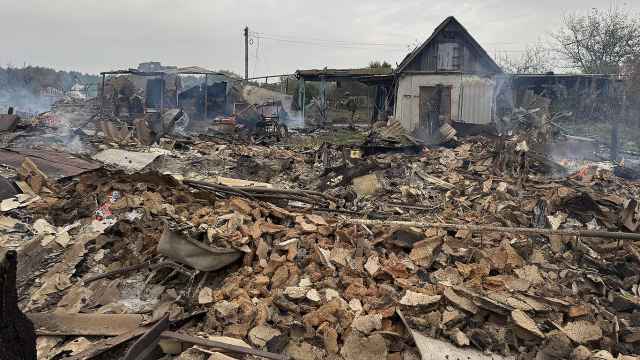Despite a cease-fire declared a month ago between the Ukrainian forces and pro-Russian rebels, the biggest city in eastern Ukraine remains embroiled in fighting that includes daily artillery and rocket barrage hitting residential areas.
The fighting focusing on the airport of the rebel-held city of Donetsk shows the difficulties of enforcing a truce that has held in most other areas of eastern Ukraine since it was declared on Sept. 5.
Day after day, artillery shells and rockets fly overhead. Many explode in densely populated residential areas as the rebels have fought to dislodge Ukrainian government forces from the Donetsk airport just north of the city. Nine civilians were killed Wednesday, and a Red Cross staffer was killed Thursday. They were among scores killed and wounded since the fighting was supposed to have stopped.
"All windows in our house were shaking, I was sitting on my bed and I had to hold tight not to fall," said Valentina Ryabchevskaya, a Donetsk resident, describing a recent shelling near her home. "Windows were shaking, doors in cabinets opened. It's terrible how they treat people."
The barrage has intensified this week, with shells hitting apartment buildings, a school, a bus stop, and the Red Cross office. The United Nations and the European Union voiced concern about the fighting that threatens to derail a fragile truce that has held in most other areas in eastern Ukraine since it was declared on Sept. 5.
Negotiators representing Russia, Ukraine, pro-Russian rebels and the Organization for Security and Cooperation in Europe tried to consolidate the cease-fire with a follow-up agreement to create a buffer zone that requested each party to pull its artillery 15 kilometers back from the frontline.
The deal has helped reduce hostilities, but fighting has continued at a few strategic locations. Donetsk, home to a million people before the conflict, has remained the main flashpoint.
The rebels have shown no inclination to pull their forces back from their biggest stronghold, and the Ukrainian forces have been equally reluctant to relinquish what they see as a key strategic asset.
For Ukraine, the airport has become a symbol of its military valor, and losing it would be certain to fuel public anger against President Petro Poroshenko, who has faced criticism for caving in to Russia by accepting a truce. A retreat from the airport would undoubtedly put the Ukrainian leader in more trouble ahead of Oct. 26 parliamentary elections, which he hopes will help cement his grip on power.
More than 3,500 people have been killed in fighting between the pro-Russia rebels and government troops since the mutiny in eastern Ukraine erupted in April following Moscow's annexation of Crimea. The Ukrainian forces appeared close to defeating the rebels in late August, but a rebel counter-offensive swiftly turned the tide against the government.
Ukraine and the West have accused Russia of backing the rebels with troops and weapons, claims the Kremlin has denied. Poroshenko has defended the truce and a recent law granting broad autonomy to the rebellious east, saying that an exclusive reliance on military force would only provoke Russia to send even more troops in to prevent the rebels' defeat.
The airport is a thorn at the rebels' side, a key bridgehead from which the Ukrainian forces could target rebel positions in Donetsk. Andrei Purgin, a rebel leader, said that the government forces must be pushed at least 15 kilometers (9 miles) back from the airport to make the city safe.
Fighting for the airport and a few other areas has continued because the frontline is uneven and chaotic and each side wants to carve it to its advantage before moving any forces back.
The airport was rebuilt to modern standards a couple of years before the conflict. The new glass-and-steel main terminal is now a hulking ruin, but the airport's 4-kilometer runway could receive large cargo planes with supplies — potentially a major asset for the region that so far has relied exclusively on truck convoys bringing aid from Russia.
The rebels have repeatedly tried to capture the facility. They suffered a particularly painful defeat in May, losing dozens of men when Ukrainian forces pummeled them with fighter jets, helicopter gunships and artillery.
The insurgents have since become more cautious, periodically probing the airport's defenses and firing artillery at Ukrainian positions. Rebel chiefs say it has been challenging to storm the airport because Ukrainian forces have relied on a sprawling maze of tunnels and bunkers dating from Soviet times.
During the week, the rebels made some gains around the airport, seizing a few buildings on the perimeter that allowed them to target the government forces with higher precision.
During Friday's fighting, an AP reporter saw rebel tanks firing salvo after salvo at the main terminal as snipers shots rang across the area.
Throughout the fighting, government forces and rebels have regularly used heavy artillery and rockets, catching Donetsk residents in crossfire. The Soviet-era Grad (Hail) systems used by both sides are capable of hurling unguided rockets to the distance of up to 20 kilometers with devastating effect but little precision, and have inflicted particularly heavy damage to residential areas.
Amid the constant thud of artillery, classes began in Donetsk schools Wednesday a month later than usual.
One school was hit by shells on the opening day, killing a teacher and two parents. At least 70 children were in school the school and took shelter in the basement, according to the city's administration.
Amnesty International this week strongly warned the Ukrainian government and the rebels that using indiscriminate weapons against populated areas may amount to a war crime.
"Ukrainian government forces must immediately stop firing on residential areas in Donetsk," John Dalhuisen, Amnesty International's Europe and Central Asia Director, said in a statement. "By carrying out military operations in the neighborhood, rebel forces share responsibility for these latest attacks with the Ukrainian forces."
There have been claims that the warring parties could resolve the airport deadlock by trading territory. Donetsk region Gov. Serhiy Taruta said this week that Ukrainian and rebel representatives were considering a compromise, under which the airport could be exchanged for some areas controlled by the rebels.
Both the Ukrainian government and the rebels have quickly dismissed Taruta's claim.
A Message from The Moscow Times:
Dear readers,
We are facing unprecedented challenges. Russia's Prosecutor General's Office has designated The Moscow Times as an "undesirable" organization, criminalizing our work and putting our staff at risk of prosecution. This follows our earlier unjust labeling as a "foreign agent."
These actions are direct attempts to silence independent journalism in Russia. The authorities claim our work "discredits the decisions of the Russian leadership." We see things differently: we strive to provide accurate, unbiased reporting on Russia.
We, the journalists of The Moscow Times, refuse to be silenced. But to continue our work, we need your help.
Your support, no matter how small, makes a world of difference. If you can, please support us monthly starting from just $2. It's quick to set up, and every contribution makes a significant impact.
By supporting The Moscow Times, you're defending open, independent journalism in the face of repression. Thank you for standing with us.
Remind me later.





